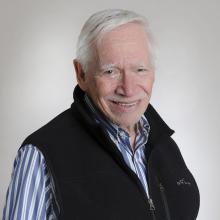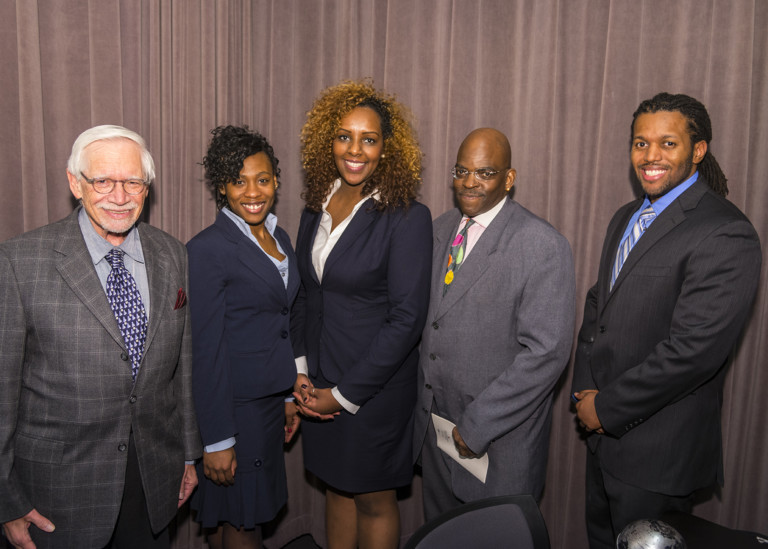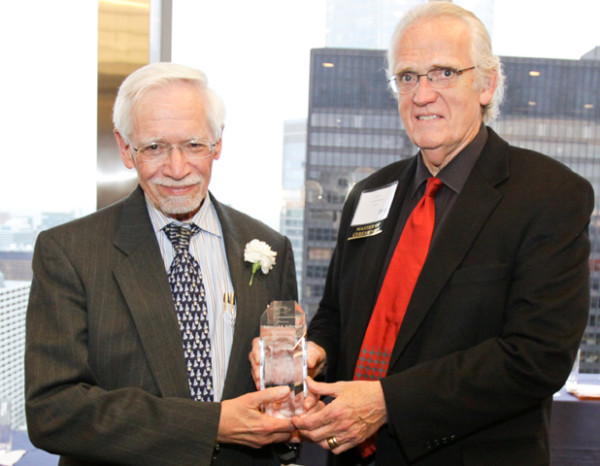by Nicole NeSmith, Development & Communications Associate at CARPLS

As a last nod to our 25th anniversary, we wanted to feature one of Al Schwartz’s (CARPLS Executive Director) heroes and mentors—Leonard Schrager.
Leonard’s incomparable legal career spans over 50 years as a practicing lawyer, law professor, law school dean, mediator, arbitrator, and active participant in the legal profession. For the last 20+ years, he has been a luminary in legal aid for his empathy and kindness to others.
Striving to do good and well
As far back as he could remember, Leonard always wanted to be a lawyer. “I just thought they were great people,” Leonard said.
Despite this, he initially studied business at Northwestern University and became a Certified Public Accountant. He practiced accounting for a short while, and in 1956 enrolled in the Northwestern University Pritzker School of Law. When Leonard graduated, he served in the military for six months, worked as an accountant again, and eventually joined a law firm.
In 1963, he became partner, the same year Lowell Sachnoff joined the firm that came to be known as Sachnoff Schrager Jones and Weaver, which after several additional name changes merged into Reed Smith LLP.
“[When I met him], Leonard said a law firm should not be just a money-making machine,” said Lowell, senior counsel at Reed Smith. “It should strive to do both good and well. Well in order to be financially stable. Good because law is a profession. [Leonard believed] that lawyers should use their skills and experience to do good in the community besides doing well for our clients. When I graduated from law school, our Dean said the same thing to us. To hear that from a young lawyer like Leonard gave me a comfort level that this was the right firm for me.”
Austin Hirsch, a partner in Reed Smith’s Global Corporate Group, had a similar experience. Nearly 50 years after he was hired by Leonard as a summer associate, he remains at the same firm.
Leonard always had a knack for seeing open doors, and he extended that to others. When Austin was still a summer associate, Leonard encouraged him to go on a date with a friend’s daughter. “And he ended up introducing me to my wife Beth. Leonard and his wife Joyce have always been a special part of our lives. So Leonard is not only responsible for my professional career, he is also responsible for my personal happiness.”
This closeness extended into their work life as well. “One of the reasons I accepted the position was because I observed a bridge game that was going on at five in the afternoon with some eventual colleagues,” said Austin. “It was a culture that took time to get to know each other, respected each other, and that had a lot to do with Leonard.”
Our true north
Leonard’s sense of fun never mired his concern for others and his desire for more pro bono work in the legal profession.
“When we would occasionally have a bad month, someone might ask if we should cut back on pro bono hours, but Leonard reminded us that ups and down are normal and…we shouldn’t give up taking pro bono cases,” Lowell said. “Leonard was always our true north.”
“It was Leonard’s modeling of respect for people, respect for clients, transparency, and all the things that people like to tout but seldom see in the real world,” Austin said. “It was actualized in our firm through his work.”
Leonard felt proud of his work at the firm, but in 1980 he realized he wanted a change and accepted a teaching position at the John Marshall Law School (JMLS) in Chicago.
“I thought that it was the right thing for Leonard to do personally and professionally, because Leonard was always a seeker,” Lowell said. “He didn’t want to just be a lawyer who did another business deal. Working with young students, who were about to be the next generation of lawyers and teachers, gave him the opportunity to effect real change.”
After a few years of teaching at JMLS, Leonard was appointed Dean and remained in that position until 1987. “It was a very different role from what I had been doing previously, both in teaching and in practicing law, but it opened my mind.”
Leonard thought back to when he attended Northwestern’s law school in 1956. His entering class of 100 or more students was very homogenous. “There was one African American man, who eventually became the first black federal judge appointed in Georgia, and one woman in the entire class. The rest were white men,” Leonard said.
Ultimately, he used his position to expand opportunities for women, minorities, and first-generation students to attend law school at JMLS.
“The injustice in the world is so deadly and so pervasive,” Leonard said. “Back then, for women and especially minorities, progress was so slow. I just felt that there was something that I could do for the legal profession.”
A great teacher, first and foremost
Leonard started a special program, LEAP, the Legal Education Access Program, the purpose of which was to increase minority enrollments.

“Everyone worked so hard,” said Leonard. “I remember one young lady who applied and was accepted. She just finished college, so I asked her if she worked anywhere, and she said that she manned the telephone lines from 12am-8am. I asked, eyes wide, ‘Now how did you ever find the time to study?’ She said she only got by because friends would visit her in shifts and ask her questions to study and keep her alert.”
He continued to teach at JMLS until 2005. John Corkery, retired Dean of the John Marshall Law School, said Leonard was always a great teacher, first and foremost. “He had a sense of what’s going on in the world, really great leadership skills, and was just very bright. People had great confidence in his abilities.”
Dean Corkery also commends Leonard for inspiring a number of students to become well-rounded lawyers. “He wanted his students to be concerned with fairness in the system, and that involves a fundamental access to justice.”
A mensch, really and truly
Though his impact at JMLS was truly significant, Dean Corkery believes that Leonard’s service as President of both the Chicago Bar Association and the Chicago Bar Foundation shows in equal measure the effect his leadership has had on making the profession better.
“Leonard was one of the early and strongest advocates for legal aid and for getting lawyers involved,” said Terry Murphy, Executive Director of the Chicago Bar Association. “He had a deep, legitimate concern for those in need and was an ambassador of goodwill for the legal aid community.”
Considered one of his greatest contributions, Leonard created what’s now known as the CBA & CBF Pro Bono and Public Service Awards Luncheon. Bob Glaves had just been brought on as the Executive Director of the Chicago Bar Foundation, and Leonard wanted to do something special. Their work produced a first luncheon of 50-100 attendees that has expanded to 900 people at this point.
“People like Leonard don’t do what they do for praise,” notes Terry. “They do it because it is the right thing to do and they know they’re contributing in a meaningful way to the legal profession and to the public. Leonard is a man for all seasons and truly a mensch.”

Leonard notes, however, that this motivation for access to justice was not innate in him from a young age. Instead, he “owes a lot” to organizations like CBF, CBA, and CARPLS for opening his mind. For one thing, he was skeptical of CARPLS in the beginning. “A $50,000 grant application to the CBF came in for CARPLS, and I thought ‘wow that’s a lot of money,’ this was the 90s after all, and I didn’t quite understand [what they were]. But once they walked us through their mission, I was sold.”
Until he became involved in various facets of the legal aid community, Leonard felt in conflict with many traditional legal practices. “When I worked at the firm, many people couldn’t afford our rates. And then when I moved to the law school, I was torn between writing and doing research on obscure issues that no one would read or getting involved in the legal profession in a different way. I saw what CBF and CBA had done, what CARPLS was doing in championing access to justice, and I was just blown away. I had this sense that this was the really important stuff.”
Leonard’s profound commitment to legal aid, as evidenced by his colleagues’ unremitting praise and retelling of his idiosyncratic career, culminated in CBF’s Leonard Jay Schrager Award of Excellence, endowed by attorneys at Reed Smith LLP.
“When Leonard became president, many of us became more interested in CBF, along with the assistance of current Executive Director Bob Glaves,” Austin said.
When CBF decided that they wanted to celebrate various pro bono contributions, one of which would be a professor who had an impact on the legal community, Leonard came to mind. Though he was no longer with Reed Smith, several individuals at the firm joined resources to create a fund that would be used to honor a professor each year, selected by a neutral part of the CBF. The award has since been given across many of the law schools in Chicago and are from a variety of disciplines.
“We always invite our summer interns and associates because it’s a great way to observe the impact that lawyers can have in access to justice,” Austin said.
For Dean Corkery, he couldn’t think of anyone better suited. “I mean, how many people have accomplished what Leonard has?”
But for Leonard, his reaction to the award, and to this article for that matter, was sheer incredulity. “I just keep thinking, why me?”
Leonard Jay Schrager has almost 60 years in the legal profession. Over this time, he has served as a member of the Special Commission on the Administration of Justice in Cook County, and as president of The Chicago Bar Association, The Chicago Bar Foundation, and The Center for Conflict Resolution. He has been a board member of CARPLS, the ARDC and The Lawyers Trust Fund. Until his retirement, he was an active mediator and arbitrator in a variety of cases. Leonard was given the CARPLS Ralph A. Gabric Lifetime Achievement Award in 2011 for enduring leadership.

